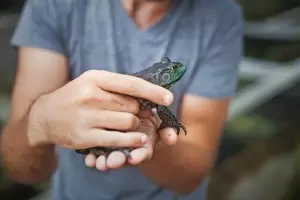
Herpetology is the branch of zoology which deals with the study of reptiles and amphibians such as snakes, turtles, and iguanas. It deals with their behaviors, geographic ranges, physiologies, development, genetics, and more.
A herpetologist is a zoologist who studies reptiles and amphibians such as frogs and salamanders. Many herpetologists focus on conservation of these species. Others use them to assess overall environmental conditions in a particular area.
What Does a Herpetologist Do?
Herpetologists study animals in the wild, where they determine or assess potential threats from pollution, invasive species, disease, and other factors. They often inventory or estimate animal populations. Herpetologists study their behavior, development, genetics, and distributions to better understand their ecological niches, the ecosystem services they supply, and the challenges they face. They may make recommendations to policy makers on how to protect them. Since many reptiles and amphibians are considered "indicator species", their research may be used to evaluate overall changes in the environment. Herpetologists may plan and manage disease control and conservation programs. Many conduct environmental impact studies or wildlife impact studies for the government. They may share their research findings by writing journal articles or presenting at professional conferences. Some educate the public through programs and talks.
Collection managers at museums care for preserved specimens of amphibians and reptiles. They catalog, organize, and document them, and make them available to researchers. These jobs usually require a master's degree in biology or museum studies.
Zoo curator and supervisor jobs are administrative positions that involve running a herpetology department, managing educational programs, and related duties. They usually only work with reptiles and amphibians.
The work of herpetologists is important for the conservation of threatened and endangered species like American crocodiles and sea turtles. Many species of frogs are barraged by various threats, including disease and climate change. Herpetologists may focus on saving this species, or using them to evaluate overall environmental conditions in an ecosystem.
Where Does a Herpetologist Work?
Many herpetologists work as faculty members or research staff at colleges and universities. Others are employed by government agencies that deal with wildlife and the environment. Many get jobs in museums where they work with exhibits and collections and participate in public programming. Others work for zoos where they work with live animals and the public. Industrial and medical biotechnology now offer new employment opportunities for biological researchers. Other large companies hire herpetologists as environmental specialists. Some herpetologists teach biology in high schools.
A herpetologist's work environment will likely depend on his or her area of research. Research studying the developmental, anatomical, or genetic aspects of reptiles and amphibians is generally done in laboratories. Research on a species' ecology, behavior, reproduction, population biology and distribution usually involves a lot of fieldwork. Fieldwork can be strenuous and isolating, and may require night hours when dealing with nocturnal species.
What Is the Average Herpetologist Salary?
Herpetology Jobs & Job Description
Herpetologists study organisms that fall under the classification of amphibian. Due to the deep but focused scope of this role, there is little variation between different herpetologist careers. While some may teach, many others prefer field research or care and stewardship of specimens. Duties include:
- Providing excellent day-to-day care of specimens within their jurisdiction
- Reviewing current research and scientific literature
- Organize exhibits
- Keep enclosures well maintained
- Participate in the ethical acquisition, disposition, transport and acclimation of reptiles
- Care for and feed the plants and animals in the exhibit
- Participate in the design and construction of exhibits
- Act as a representative on behalf of their organization to the public
- Perform security protocols
- Strategically plan for reptile husbandry
- Assist with venom extraction
- Assist with veterinary medical care and laboratory work
- Maintain a clean facility
- Maintain security, inventory, feeding and husbandry records databases
- Assist with other documentation and record keeping as needed
- Develop systems to better track data
- Provide input and support for quality assurance and health & safety systems
Senior herpetologists often assume a leadership role within the workgroup. Additional tasks may look like:
- Advising administrators and other stakeholders regarding herpetological information
- Providing consultation to external agencies, professionals, or researchers
- Creating and delivering presentations, reports, and articles for internal or external partners or the general public
- Engaging in the design and development of facilities
- Developing software programs to facilitate data collection and predictive modeling
- Planning, organizing, and participating in outreach and advocacy programs
- Constructing funding and grant applications
- Overseeing team budgets, milestones, and systems
- Assisting and mentoring team members
- Establishing efficient workgroup systems
- Supporting team members' research
What Is the Job Demand for Herpetologists?
Employment in these fields is projected to grow 5% between 2020 and 2030, which is slower than average for all occupations. Retirements will open up some opportunities in this field. However, government budgets will govern demand for zoology jobs in the public sector.* Competition for jobs is very strong. Candidates with practical experience gained through volunteer work for zoos, wildlife rehabilitation centers, and nonprofit organizations will have the best opportunities.
How Do I Get a Herpetologist Degree?
Nearly all positions in this field require at least a bachelor of arts (B.A.) or a bachelor of science (B.S.) degree in biology or a closely related field. A few schools offer undergraduate programs in herpetology, natural history, and invertebrate zoology. Biology courses for aspiring herpetologists generally include introductory biology, anatomy, physiology, ecology, herpetology, and other coursework. Students must also take courses in chemistry, calculus, physics, and computer science. Knowledge of foreign languages can open up opportunities for fieldwork and research in other countries and make it go more smoothly.
Opportunities for those with only a bachelor's degree are limited. Many herpetologists work in research positions, which require advanced degrees. This is almost always the case for faculty positions at colleges and universities.
Related Degree Options for Herpetologists
What Kind of Societies and Professional Organizations Do Herpetologists Have?
- The American Society of Ichthyologists and Herpetologists is an international professional organization dedicated to the study and conservation of fishes, amphibians, and reptiles. It organizes an annual meeting and symposia, publishes the scientific journal Copeia, and hosts a job board.
- The Society for the Study of Amphibians and Reptiles is the largest international herpetological society. It focuses largely on conservation. It has a diverse offering of publications, meetings, and symposia. It also hosts a list of regional herpetology societies around the world, and offers a manuscript review service for members.
*2020 US Bureau of Labor Statistics salary figures and job growth projections for zoologists and wildlife biologists reflect national data not school-specific information. Conditions in your area may vary. Data accessed September 2021.





